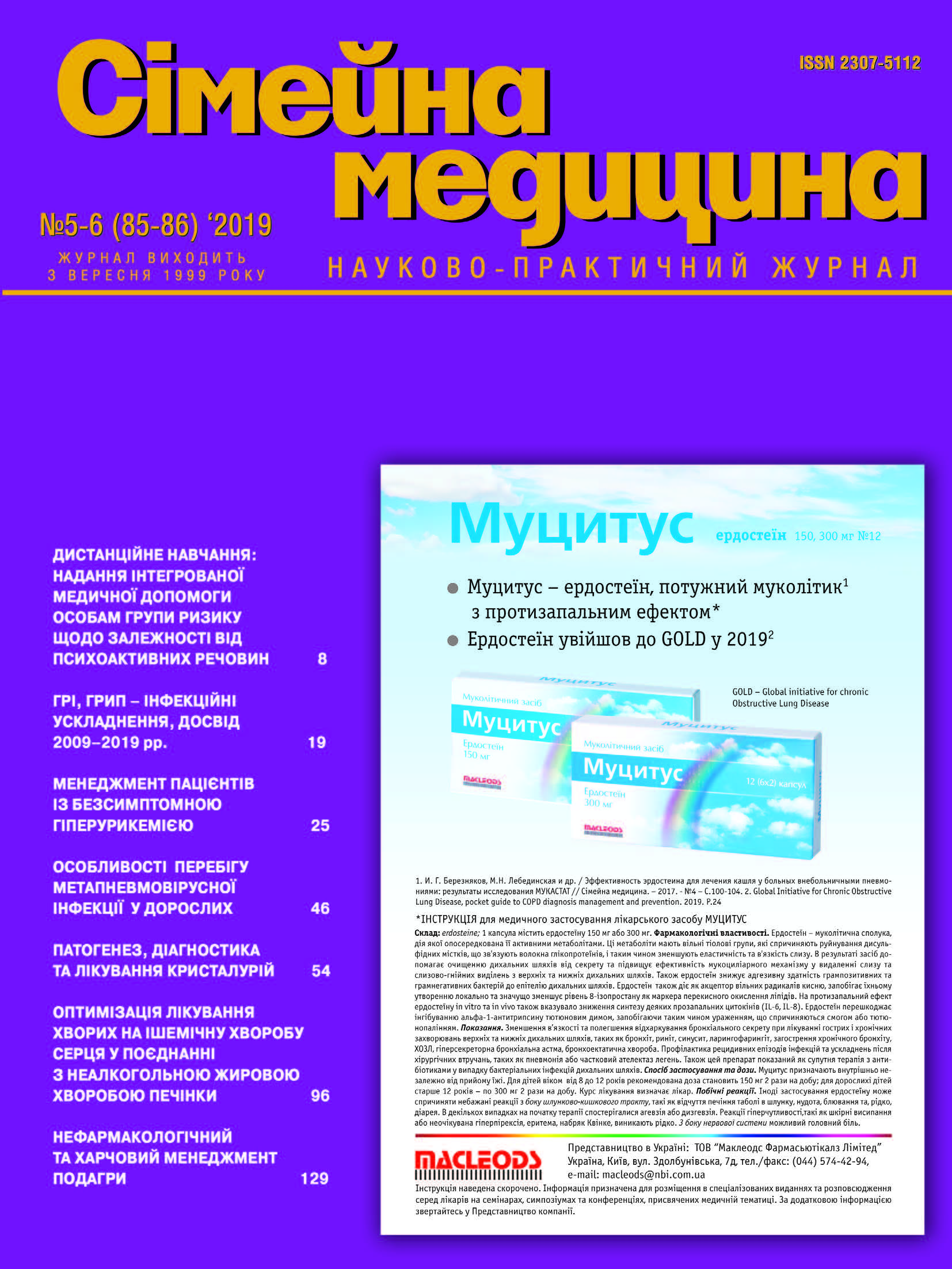Structural and Functional Changes in Coronary Vessels in Patients with Coronary Heart Disease in Combination with Type 2 Diabetes
##plugins.themes.bootstrap3.article.main##
Abstract
Cardiovascular complications are a major cause of morbidity and mortality in diabetes mellitus (diabetes mellitus) (80% of patients with type 2 diabetes mellitus die from cardiovascular complications). Coronary heart disease (CHD) in patients with type 2 diabetes manifests 2-3 times more often than in people of the same age without diabetes. The heart is one of the main target organs in diabetes, and its functional state largely determines the course and prognosis of cardiovascular complications in patients with diabetes.
The objective: to evaluate the features of coronary artery disease in patients with coronary heart disease, depending on the presence of type 2 diabetes.
Materials and methods. 100 patients with coronary heart disease were examined: stable angina pectoris, among which 60 patients with CHD were combined with type 2 diabetes and 40 patients with coronary heart disease: stable angina pectoris II–III FK with no carbohydrate metabolism disorders. Non-invasive CT angiography was performed to assess the status and coronary artery patency of the coronary arteries. With the help of MSCT it is possible to obtain unique information on the presence of coronary artery calcinosis, the so-called total calcium index (SCI) – calcinosis of coronary arteries, reflecting its degree.
Results. In the course of MSCT, the presence of coronary artery calcinosis was found – the total calcium index. The data obtained in the study show the adverse effect of the violation of carbohydrate metabolism on the development and progression of the atherosclerotic process. For patients with type 2 diabetes mellitus is characterized by a multicentric, diffuse defeat of the coronary bed. Among patients in group 1, three-vessel lesions of the CA were significantly more common, while in patients of the 2nd group, one and two-vessel atherosclerotic lesions of the CA were significantly more likely to be registered. Patients with coronary heart disease and concomitant type 2 diabetes had more severe coronary artery disease than those without concomitant DMD type 2. For patients with coronary heart disease and concomitant diabetes mellitus type 2, early calcinosis of the large cardiac vessels is characteristic according to the MSCT. A high correlation between the total calcium index and carbohydrate metabolism indices (HvA1c,%), lipid metabolism (LPDH, TG, IA) was found in patients with coronary artery disease with concomitant DM type 2, indicating the effect of carbohydrate and lipid metabolism disruption on the process of atherogenesis, which is more pronounced in patients with type 2 diabetes.
Conclusions. The SCI score obtained by the MSCT indicates the prescription of atherosclerotic lesions and allows to assess the risk of destabilization of atherosclerosis and the development of cardiovascular catastrophes. MSCT-coronography opens new possibilities for the diagnosis of coronary artery disease with the detection of atherosclerotic changes in the vessels of the coronary bed, the establishment of localization and the degree of stenosis in the coronary arteries.##plugins.themes.bootstrap3.article.details##

This work is licensed under a Creative Commons Attribution 4.0 International License.
Authors retain the copyright and grant the journal the first publication of original scientific articles under the Creative Commons Attribution 4.0 International License, which allows others to distribute work with acknowledgment of authorship and first publication in this journal.
References
Паньків В.І., Хуторська Л.А. Ризик загальної і серцевосудинної смертності, основних серцевосудинних подій у хворих на цукровий діабет 2-го типу залежно від вибору терапії після встановлення діагнозу //Буковинський медичний вісник. – 2013. – Т. 17, № 1 (65). – С. 80–85.
Особенности нарушений структурно-функциональных параметров сердца у пациентов с хронической сердечной недостаточностью и диабетической автономной кардиальной невропатией / М.Е. Стаценко, С.В. Туркина, С.С. Шалаева [и др.] // Терапевтический архив. – 2013. – № 10. – С. 23–28.
Бильченко А.В. Многофакторный подход к терапии сахарного диабета 2-го типа и новые горизонты в контроле заболевания // Здоров’я України 21 сторіччя. – 2016. – № 3. – С. 4–6.
Бондарь И.А., Демин А.А., Королева Е.А. Состояние сердца и сосудов при диабетической автономной нейропатии // Сахарный диабет. – 2014. – № 2. – С. 41–46.
Metabolic control and cardiovascular risk factors in type 2 diabetes mellitus patients according to diabetes duration / Primary care Group for the study of Diabetes, J.F. Nadal, P. Roura-Olmeda, B. Benito-Badorrey, A. Rodriguez-Poncelas, G. Collde-Tuero, M. Mata-Cases // Family Practice. – 2015. – 32 (1). – Р. 27–34.
Попруга А.О., Стародубцев С.Г., Бобирьова Л.Є. Особливості клінічного перебігу ішемічної хвороби серця у хворих на цукровий діабет 2-го типу залежно від віку і статі // Сімейна медицина. – 2016. – № 3. – С. 89–93.
Долженко М.М., Перепельченко Н.А., Базилевич А.Я. Ішемічна хвороба серця на тлі цукрового діабету 2-го типу: своєрідність перебігу та обґрунтування терапії // WebCardio.org. – 2010.
Наказ МОЗ України № 1118 від 21.12.2012 «Про затвердження та впровадження медико-технологічних документів зі стандартизації медичної допомоги при цукровому діабеті 2-го типу»
Cardiovascular safety of anti-diabetic drugs / R. Kumar, D.M. Kerins, T. Walther // European Heart Journal. Cardiovascular Pharmacotherapy. – 2015. – Р. 202–208. – Doi: 10.1093/ehjcvp/pvv035.
Ткаченко В.І., Маньковський Б.М., Долженко М.М. Аналіз медичного стану пацієнтів з цукровим діабетом 2-го типу та його вплив на розвиток ускладнень // Міжнародний ендокринологічний журнал. – 2014. – № 8. – С. 18–23.
Pop-Busui R. Cardiac autonomic neuropathy in diabetes. A Clinical perspective // Diabetes Care. – 2010. – 33 (2). – P. 437–441.
Diabetes and cardiovascular disease in older adults: current status and future directions / J.B. Halter, N. Musi, H.F. McFarland, J.P. Crandall, A. Goldberg // Diabetes. – 2014. – 63. – Р. 2578–2589.Standards of Medical Care in Diabetes-2014 // Diabetes Care. – 2014. – Vol. 37.
Rodriguez-Poncelas A., Coll-de-Tuero G., Saez M. et al. Comparison of different vascular risk engines in the identification of type 2 diabetes patients with high cardiovascular risk // BMC Cardiovasc. Disord. – 2015. – Vol. 15 (1). – P. 121. doi: 10.1186/s12872-015-0120-3.
Standards of Medical Care in Diabetes – 2014. Diabetes Care. 2014: 37.
Сергиенко О.О., Сергиенко В.О. Кардіоваскулярна автономна нейропатія у хворих на цукровий діабет // Здоров’я України. – 2013. – № 3. – С. 38–41.





